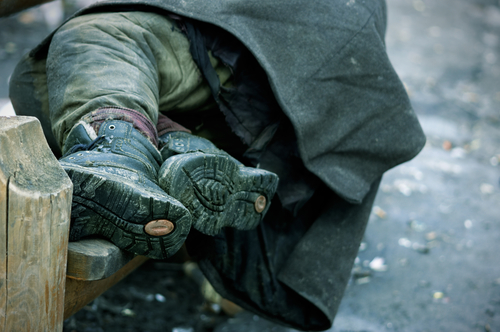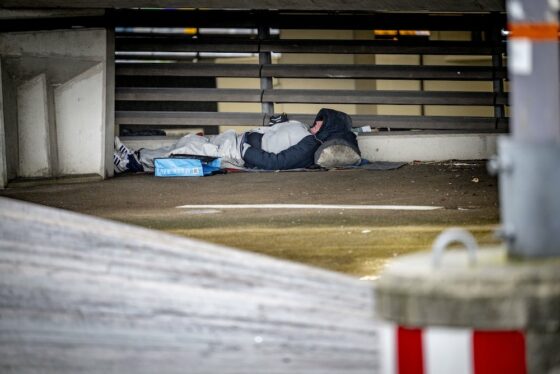Does Rotterdam’s approach to homeless East Europeans work?

Last summer, Rotterdam introduced an action plan to get homeless Eastern European migrants off the streets. The measures include shelter and help with finding work, but also returning the migrants to their home countries. Willemijn Sneep and Zuza Nazaruk spoke to council officials, the homeless, social workers, and experts to see how the plan is working out.
Last winter, about 11,000 households in downtown Rotterdam received a letter. “We regularly get complaints in this neighbourhood about nuisance caused by the homeless, addicts, and beggars,” the letter said. “EU migrants make up a big part of this group.” In the letter, the aldermen Ronald Buijt (Leefbaar Rotterdam) and Tim Versnel (VVD) outlined their “intensive approach”.
The approach focuses partly on providing shelter and help with finding work, and partly on taking a more repressive approach against “troublemakers”. The focus areas are hot spots in Rotterdam West, the city centre, and Zuidplein in the south.
According to Buijt, migrants from Eastern Europe make up around three-quarters of all the homeless in Rotterdam. These are often workers who were exploited by their employers and staffing agencies. Despite recent changes in the law, agencies often still tie the work contracts to housing. Losing a job then also means losing a house.
Krzysztof sleeps on the street around the Central Station. He told us what his nights look like at the end of December, in the bike park behind the station.
“I go to the parking lot around 9.30 pm. I sleep there between the cars. The security comes around midnight, they wake me up and send me away. I go back to the station, I try to go upstairs because it’s warm there. After 1 am, the security sends us away again. I go outside, smoke a cigarette, wander a bit. Then I go back to the station and have two more hours of calm.”
“I don’t do anything,” he says. “I don’t drink alcohol there, I don’t smoke inside, I just sit in a warm place. Still, they send me away as if I was a dog.”
Care and repression
The key measure of the plan is a shelter for about 60 EU nationals, on the Volkelstraat near the airport. The shelter opened in July 2024. People can stay there for 6-8 weeks, day and night, join a detox programme for alcohol and drug addiction, and participate in the monthly job fairs to find work.
During our talk in December, Krzysztof was waiting for an appointment with a worker from the foundation Stichting Ontmoeting, whom he met in the shelter at the Pauluskerk. “She said she will come and find me a job and a room.” Jaroslaw, who was sitting next to him on a sleeping mat, said that he’s starting a new job with Mondial Uitzend on Monday.
“We take you by the hand and see if you can go back to work or if going back to your home country is the best option for you. If you don’t want to cooperate and you go back to the streets, we keep an eye on you,” Buijt says
In September 2023, Buijt started a steering group for sending jobless EU nationals back home, together with the prosecution public service, the immigration officials, the IND, the railway operator NS, and NGOs.
People can be sent back if they receive six ‘registrations’ within eight to twelve months. There are no more fines for sleeping outside, but the homeless get a ‘registration’. NS staff are now also authorized to issue ‘registrations’ for nuisance or damages. In 2023, there were 84 ‘forced evictions’. Two years earlier, in 2021, there were 53.
Yet, sending people back is not a perfect solution, given the EU’s open border policy. Tadeusz was sent out of the Netherlands in May 2024. Two police officers supervised him on a plane to Poland. “I came back in June. Now I’m banned from staying in the Netherlands,” he says.
“We can’t prevent this, there are no border checks,” Buijt acknowledges. “But someone who was sent back once can be directly returned again. Maybe that makes people more careful.”

Mark van Ostaijen, a sociologist at the Erasmus University in Rotterdam, says the effectiveness of this measure is limited. “People are free to travel,” he says. “Giving fines to people who cause problems and sending them away gives a lot of administrative work to the law enforcement officers, while this way you deal with 30 people. Whether you find this valuable is a political choice.”
Results
Some 151 people came into the shelter between its opening and 23 October 2024. Out of those, 60 are still receiving support, 32 found work, and 12 were sent back. A further 39 people didn’t “successfully finish” their stay.
Buijt finds these numbers “a reasonable success,” given that anyone can come to the shelter, including people who have long lived on the streets and often cause trouble. “About 40% drops off but if you help 60% from this difficult target group, that’s good,” he says. The shelter will be open until June 2025.
The approach itself is not so new, says Van Ostaijen. “The integrated approach where the municipality works with national partners like the IND, and the partners like Barka [foundation], has been there a long time.”
- Migrant workers being illegally dismissed to save agency costs
- Companies that exploit migrant workers face closure
- NL must treat EU workers well or face the consquences
Yet, the shelter is a new and remarkable element, he adds. “It’s fascinating that this plan combines ‘control’, or repression, with ‘care’, like facilities and help. These two sides are, from a political perspective, always far from each other.”
Martijn van Leerdam, pastor from the Pauluskerk, calls the new shelter “a partial answer to the growing homelessness.”
It can help people who recently ended up on the street, “but there remains a big group for whom a temporary shelter is no solution,” he says. Such people – with serious mental issues, addictions, or who cannot work anymore – continue to come to Pauluskerk for help. The only permanent solution, he says, is unconditional shelter and affordable housing.
Dependencies
We spoke to four homeless Polish men who slept in the bike park behind the Central Station. All four worked in the Netherlands for a longer time, the shortest was four years. “I came here first 16 years ago. I worked in various work agencies and did all kinds of work: carpentry, five years in a recycling company, I have a forklift certification,” says Krzysztof.

Often, EU workers cannot access the Dutch welfare system even if they have long worked in the country. This happens, for example, because the work agency didn’t register them in the municipality, so they cannot prove how long they worked and lived in the region. Social workers from Barka and Stichting Ontmoeting say that informing people that they need to register in the municipality is a “good idea”.
“The double dependencies are a problem – the whole organisation of migrant work lies with the employers but all the consequences are absorbed by the society”, Van Ostaijen says. “Separating work and housing would be an important step. But you can also ask yourself, how is it possible that this sector has existed for 15-20 years and no political coalition managed to solve the problem.”
Good employers
The municipality tries to work with ‘good’ work agencies in the Good Employment coalition. “We put together a few good employers there,” says Versnel. “To show the workers that they have a choice.” Until now, agencies Tempo Team, Hago Zorg, Network People B.V., Labour Power Company, and People 21 have signed the agreement. The municipality is looking for more employers to join.
Earlier this month, social affairs minister Eddy van Hijum promised that companies which exploit migrant workers will face closure.
Other legislation designed to stop low-skilled workers from abroad from being exploited by staffing agencies should come into effect on January 1, 2026. It will have required staffing agencies to get formal approval from the ministry before being allowed to operate and pay a deposit of €100,000 as evidence of their commitment to pay workers properly and meet tax and premium obligations.
The homeless men behind the Central Station will likely value this approach. “The work agencies always scam you,” says Piotr. “So many times the work proved other than expected or I didn’t get the money I was promised. Sometimes there’s just no work.
“I need the simplest things: work and housing. I will figure out the rest.”
*The real names of Piotr, Jaroslaw, Tadeusz, and Krzysztof are known to the journalists
A longer version of this article appeared in Vers Beton
Thank you for donating to DutchNews.nl.
We could not provide the Dutch News service, and keep it free of charge, without the generous support of our readers. Your donations allow us to report on issues you tell us matter, and provide you with a summary of the most important Dutch news each day.
Make a donation